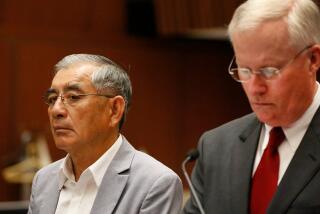Hong Kong Inquiry Renews Fears of Crackdown Under Chinese Rule
- Share via
HONG KONG — A government official facing an inquiry that touches on the gruesome unsolved murder of his daughter, suggestions of selling secrets and an unraveling government cover-up declared Friday that he was the victim of “a concerted effort to destroy his reputation.”
Laurence Leung, the former director of immigration under investigation by a parliamentary panel over his abrupt departure from the civil service last July, fended off allegations that he passed to China a secret list of British passport holders and Chinese dissidents living in Hong Kong. He testified Friday that he did not know why the Hong Kong government “forced him out” of his job.
But within hours of being offered the chance last July to retire or face an investigation because “the government did not trust me anymore,” he shredded important notebooks and diaries, opted to retire and then met a senior Chinese official for coffee, he told a special legislative inquiry.
Leung denied selling confidential information to mainland officials and other reports of alleged wrongdoing. “There have been organized efforts to ruin my reputation,” he said.
“The information in the Immigration Department is subject to strict security measures,” he said.
“Anyone, including the director, accessing the information is recorded by the computer. You can find out when exactly--which year, month, day, minute and second--anyone has retrieved information.”
Leung’s case drew attention in November when an anonymous Chinese official said the Chinese government possessed the secret list of 50,000 households that were given special British passports in a bid to prevent a panicked exodus from Hong Kong after the 1989 crackdown on demonstrators in Beijing’s Tiananmen Square. The Chinese official said the British government could not protect the passport holders.
The statement, combined with Leung’s mysterious resignation, sparked an emergency legislative session during which Gov. Chris Patten tried to reassure Hong Kong residents that Chinese officials could not distinguish the special British passports. “I have no evidence to suppose that Chinese officials have such a list,” Patten said.
Nevertheless, Leung’s case strikes at Hong Kong people’s deepest fears: that China is keeping track of who is loyal and who is not, and that Britain will not be able to help them after handing over the territory in July.
Adding to the unease, an embarrassed Hong Kong government has kept the affair quiet, insisting until after Leung’s testimony Friday that he retired for “personal reasons.”
Civil Service Secretary W. K. Lam, who offered Leung the choice of either retiring or facing investigation in July, still refuses to reveal why the government lost faith in Leung.
“These are startling revelations,” said Emily Lau, a legislator. “The government should come clean and reveal why they told Laurence Leung he had to go. We want the answer.”
Speculation about the case has been fueled by the unusual murder of Leung’s daughter in 1993. While a student in Canada, she was struck in the throat by an arrow fired from a crossbow as she walked to her car on campus. The case is still unsolved.
Leung was also investigated by a special anti-corruption commission for living beyond his apparent means as a civil servant, but he was cleared in April after he provided proof of an inheritance.
Leung said he feels under attack.
“I worked [for the government] for more than 30 years and spared no effort in the performance of my duty,” he said. “In return, I was unreasonably sacked.”
He said opposing the administration’s move to end his career “would be like throwing eggs at rocks.”
Elaborating on the revelation that he met with Chinese official Chen Zuoer, a negotiator on hand-over arrangements, just hours after filing his retirement letter, Leung insisted that the meeting was “of no significance at all.”
Leung told the panel that the meeting had been arranged earlier and lasted less than 10 minutes.
“In the conversation, I told him we would not have the chance for further cooperation as I’m going to retire,” he said.
While Patten had no praise for Leung in his terse announcement of his retirement in July, Chen lauded Leung for his work in the civil service.
More to Read
Sign up for Essential California
The most important California stories and recommendations in your inbox every morning.
You may occasionally receive promotional content from the Los Angeles Times.










